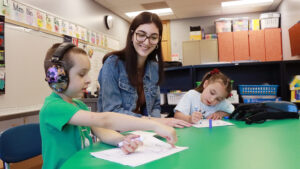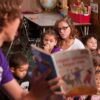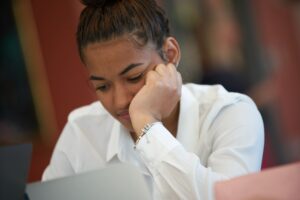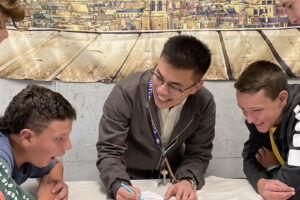Preparing Teachers to Lead 21st Century Classrooms

Are Jesuit institutions particularly well-equipped to prepare teachers to lead in 21st century classrooms? Andrea Tochelli-Ward, Ph.D., chair of the Department of Education at Le Moyne College, believes so: she has witnessed it firsthand.
Yes: education students at Jesuit colleges and universities study critical subjects, including childhood learning and special needs, instructional technology, STEM research, integration and instruction, and literacy development: they put theory into practice during multiple hands-on teaching experiences. That is to be expected.
However, that alone is not what Tochelli-Ward believes sets these programs apart from others. Put simply, Jesuit colleges and universities train burgeoning educators to care for the whole person – mind, body and spirit. They instill in them a commitment to serve their classrooms and their communities. That is what makes them distinct. Tochelli-Ward thinks that is why she has heard from multiple school administrators that when they are looking to hire a new teacher and see that a candidate from Le Moyne has applied, that person’s résumé goes to the top of the pile.

I think that [faculty and administrators] at Jesuit colleges and universities appreciate the importance of thinking holistically, and of preparing future educators to teach the whole person. We can’t expect to go into the classroom and pour information into little people and expect them to absorb it. We need to treat them as individuals and recognize their backgrounds, interests, weaknesses, and strengths. Academics are critical but, in many ways, education goes beyond academics. It’s about meeting students where they are.”
A Critical Time to Prepare the Next Generation
According to the New York State School Boards Association, 35 percent of teachers across New York will be eligible to retire over the next five years. Nationally, that number is 25 percent. It is perhaps more important than ever to prepare competent, caring professionals capable of meeting the challenges and opportunities in a 21st century classroom.
The Challenge of Artificial Intelligence
Schools That Lead credits AI tools with enhancing learning by providing tailored instruction, efficient assessment, and engaging educational environments for students–it seems inevitable that AI will only become more and more common. Tochelli-Ward herself has used AI to craft a lesson plan, in order to gauge its quality. She found that it was not bad – as a starting point. However, it needed to be refined and supplemented by a teacher who knew her students well, understood their individual strengths and weaknesses, and could capture their imaginations and attention spans. That is not easily outsourced to a non-human being.
Social-Emotional Learning and Trauma-Based Instruction
Social-emotional learning is centered on self-awareness and responsible decision-making, while trauma-based instruction recognizes how stressful, frightening events (e.g., the Covid-19 pandemic) may impact a student’s performance in the classroom. In order to protect the health of young people and educators, many schools had to move online during the pandemic. When the time came for children to return to in-person learning, some children found it difficult to regulate their behavior, engage in the classroom, and connect with others. Social-emotional learning and trauma-informed instruction can be used to help bridge some of those gaps.
Challenging & Banning Books
The American Library Association has sponsored a Banned Books Week (BBW). PEN America found that there were more than 10,000 instances of book bans at public schools during the 2023-24 academic year. Tochelli-Ward used the most recent BBW to engage her students in conversation about the use of literature in the classroom that is accessible, speaks to a variety of experiences and ways of understanding, and bolsters and supports other work they will be doing in their classrooms. She teaches her students about a theory by scholar and Professor Emerita at The Ohio State University, Rudine Sims Bishop, that books are “mirrors, windows and sliding glass doors.” Bishop has posited that books allow readers to see their own lives reflected in the pages, give them a view of other people’s lives and stories, and transport readers into a particular story, promoting understanding and empathy.
Tochelli-Ward is eager for what will come next for the teachers whom she and her colleagues are training. The College recently introduced four majors in inclusive childhood education with the opportunity for students to concentrate in English, history, political science, or world languages and literatures. In addition, the College’s Master of Science in Education Program for teachers who are already certified, is shifting online. These advancements will help the next generation of students realize their dreams of becoming educators and help to meet a critical need across the community.
I hope that our students become caring, understanding teachers who recognize that every child is unique, that they find or engage them by using books or activities that respond to their cultures, and allow them to embrace and share those cultures. I also hope they are prepared to work with whatever curriculum they are given, but that they are also able to expand the curriculum and make it their own. After all, the curriculum is only as good as the person teaching it.”

Undergraduate Education on The Heights
Nothing is more rewarding than helping children learn and grow. Teaching the ABCs, stirring young imaginations with great works of literature or sparking their curiosity with fun science experiments – no matter what subject or age group you teach, you’ll make a meaningful difference
Graduate Education on The Heights
Whether you are a New York State certified teacher looking to complete your master’s degree or a long-time teacher looking to revamp your career with a certificate of advanced study, Le Moyne is the place to do it.





